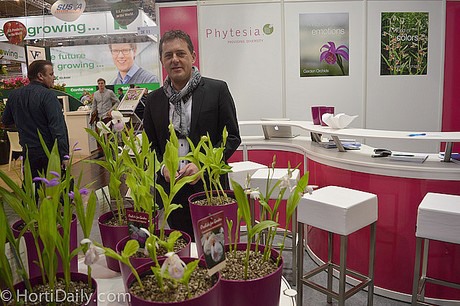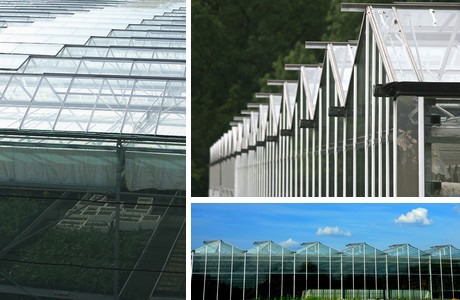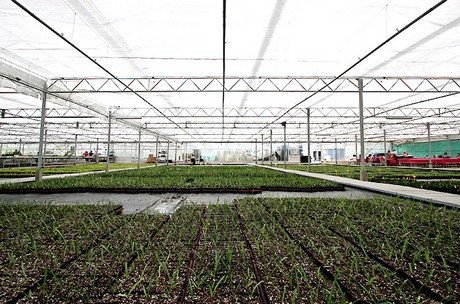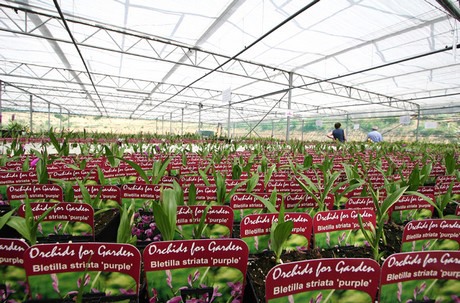
Pascal Lambe at the IPM in Essen, Germany.
Phytesia
Phytesia, located in the Belgium Ardennes, started to breed and propagate garden orchids 10 years ago. It is a spin-off of the University of Liege and is specialized in the production and marketing of garden orchids. At that time, there was only one other company in Canada that produced young plant garden orchids" he says. The young plants are mainly supplied to growers in the Netherlands, Germany and the UK. Four years ago, they built a 4000m2 sized greenhouse for the production of their own garden orchids. These finished plants are sold mainly to wholesalers in Germany, The Netherlands, Belgium and France.

The greenhouse.
Breeding and Propagation
"Every year we try to come op with three to four new varieties. These varieties will be propagated in our lab", says Lambe. The propagation process, and especially the process of mass propagation of garden orchids is challenging. "Mass propagation for garden orchids is quite new and it requires a lot of knowledge and techniques. Not much companies acquire these techniques" says Lambe. Annually, 600,000 young plants are produced in this lab.

Cultivation
In contrast to tropical orchids, the cultivation of garden orchids is not that difficult. It is, however, a very time consuming process. "It takes about 2 to 3 years to grow a garden orchid to a finished plant", says Lambe. Tropical orchids are grown in warm greenhouses and are placed in a colder area to let them flower. For the garden orchid, it takes a longer period to produce the flowers. "A rest period is very important for the plant to develop big and vigorous flowers." During this rest period, which is during winter time, the orchids are maintained in a cold greenhouse with open sides. Then, from March till September, the orchids are developing when temperature has increased again.

Bletilla struata 'purple'.
Current varieties
Currently, 50 different varieties are grown in the greenhouse of Phytesia. All varieties are winter hardy and some can even withstand temperatures below -40°C. The most popular variety is the Cypripedium. "It is an orchid with huge flowers and looks almost similar to a tropical orchid", says Lambe. The Bletilla is a garden orchid that is increasing in popularity. "The demand for this orchid is growing each year." This orchid has many small flowers and can flower for up to 7 weeks. .
Marketing
Even though the demand increased over the last few years, the garden orchid is still not as popular as the tropical orchid. "If we compare the production volumes of finished garden orchids with finished tropical orchids in Europe, there is still a large gap. On average, 250 million tropical orchids are produced and only 200,000 garden orchids. So, we still have a long way to go", says Lambe. "The plant is still a relatively unknown plant." So, in order to increase the popularity, they are making a lot of publicity through social media in France and Belgium.
For more information
Phytesia

Pascal Lambe
Email: [email protected]
www.phytesia.com
